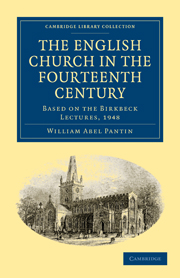Book contents
- Frontmatter
- Contents
- Preface
- List of Abbreviations
- I INTRODUCTION: THE LEGACY OF THE THIRTEENTH CENTURY
- PART I CHURCH AND STATE
- PART II INTELLECTUAL LIFE AND CONTROVERSY
- PART III RELIGIOUS LITERATURE
- IX MANUALS OF INSTRUCTION FOR PARISH PRIESTS
- X RELIGIOUS AND MORAL TREATISES IN THE VERNACULAR
- XI ENGLISH MYSTICAL LITERATURE OF THE FOURTEENTH CENTURY
- Appendix I The Latin text of passages quoted from manuscript sources
- Appendix II Two collections of didactic treatises
- Index
XI - ENGLISH MYSTICAL LITERATURE OF THE FOURTEENTH CENTURY
Published online by Cambridge University Press: 10 November 2010
- Frontmatter
- Contents
- Preface
- List of Abbreviations
- I INTRODUCTION: THE LEGACY OF THE THIRTEENTH CENTURY
- PART I CHURCH AND STATE
- PART II INTELLECTUAL LIFE AND CONTROVERSY
- PART III RELIGIOUS LITERATURE
- IX MANUALS OF INSTRUCTION FOR PARISH PRIESTS
- X RELIGIOUS AND MORAL TREATISES IN THE VERNACULAR
- XI ENGLISH MYSTICAL LITERATURE OF THE FOURTEENTH CENTURY
- Appendix I The Latin text of passages quoted from manuscript sources
- Appendix II Two collections of didactic treatises
- Index
Summary
The purpose of what follows is not to attempt to give a full account of the English mystics, but simply to offer some observations, and especially to attempt to relate this subject with what has gone before, namely the manuals of instruction for parish priests and the religious and moral didactic literature.
The materials of fourteenth-century English mysticism are very diverse. In the first place there are the four great and outstanding writers: Richard Rolle, who died in 1349; the anonymous author of the Cloud of Unknowing, who probably lived in the late fourteenth century; Walter Hilton, the author of the Scale of Perfection, who died in 1396; and Dame Julian of Norwich, the author of the Revelations of Divine Love, who was writing c. 1373. These represent widely different types, living under different conditions. Richard Rolle was a hermit, living in the country and acting at the end of his life as the spiritual director of some Cistercian nuns; a self-made mystic and highly individualistic. The author of the Cloud has so far proved quite elusive, but it has been conjectured that he may have been a secular priest. Hilton was an Augustinian canon of Thurgarton in Nottinghamshire. Dame Julian was an enclosed solitary, living in a cell adjoining a town church, in Norwich. They also differ in the basis of their literary fame. Dame Julian is only known for one work.
- Type
- Chapter
- Information
- The English Church in the Fourteenth CenturyBased on the Birkbeck Lectures, 1948, pp. 244 - 262Publisher: Cambridge University PressPrint publication year: 2010First published in: 1955



